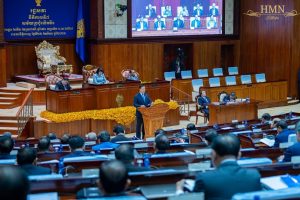The PhD thesis written by Hun Manet, who took over as Cambodian prime minister from his father Hun Sen last month, is harder to obtain than you might think.
Hun Manet was awarded a PhD by Bristol University in the U.K. in 2009 for his dissertation entitled, “What determines the firm size distribution and structural integration? A cross-county study.”
The thesis supervisor Jonathan Temple, who has since left the university, told me that the work was an econometric study of firm-size distribution measuring the relative importance of small and medium-sized companies across different countries. It was not, Temple added, specifically about Cambodia. The role of the supervisor is to oversee the progress of the research, and in no case would a supervisor be among the examiners who decide whether a PhD is awarded.
It’s hard to say much more about the thesis given the university’s refusal to make it available. It was submitted before the university had a requirement for electronic submissions, so it exists in hard copy only and it is held at the Bristol University library.
Going to the library, however, would not enable the thesis to be publicly discussed given that the university will not allow a full copy of it to be made. Neither is the institution willing to send the hard copy outside: a request by a colleague to have the thesis sent on an inter-library loan to the British Library, which is a standard way of getting access to unpublished academic work, was refused by Bristol.
It is therefore effectively impossible for the work to be discussed, which would normally lead to scholarship in the field being advanced. Neither can any practical implications for Cambodia be evaluated. An expert econometrician would need to sit and digest the 232-page document on the spot, and even then would hardly be able to initiate a public discussion of the work without being able to copy it.
This doesn’t break any rules. No-one is obliged to make their PhD thesis publicly available and original research which has potential commercial value, for example, is likely to be kept secret. But it’s still hard to understand why a doctor of economics,who has since become prime minister of a least developed country, would not want to make his work open to discussion.
So I made a request to Bristol University under the U.K.’s Freedom of Information laws to ask for the thesis to be released and for permission for a copy to be made, either in Bristol or at the British Library. Unpublished academic research is exempt from freedom of information legislation in the U.K., but this exemption is subject to a test of whether the public interest would be served by disclosure.
I put it to the university that there is a clear public interest rationale for such a release given the poverty levels in Cambodia – per head annual incomes of less than $2,000, according to the United Nations – and the fact that the thesis might reasonably be expected to be relevant in finding ways to address the issue. The Cambodian diaspora in the U.K. is tiny, and may not include even a single person with the qualifications to evaluate the thesis.
The university responded that the fact that a hard copy exists in the library, which, of course, can’t be copied, means that it is not obliged to release it. It also refused to disclose the names of the examiners. These will have included at least one academic from outside Bristol University, known as an “external examiner.”
The main challenge for many PhD candidates is to get the external examiner(s), who has/have no connection with the institution, to approve the thesis. Even if public interest grounds of finding out their identities and the countries where their institutions are based were established, there is no legal requirement for them to be released. Bristol says that to do so would violate U.K. data protection laws.
Taking a PhD at a British university, especially as a non-European student, is an expensive business far beyond the reach of most Cambodians. Hun Sen has publicly used his son’s academic credentials as a justification for handing over dictatorial powers to his son. The handover took place following national elections in July this year, which, as in 2018, took place without a recognized opposition party being allowed to stand.
British academia wonders why it is perceived as being irrelevant and out of touch, yet one of its leading institutions seems, at present, to prefer to make sure public discussion of this thesis is kicked into the long grass. There is the right to appeal this decision for an internal review, and that appeal has already been made. A further refusal would open the way to an appeal to the U.K. government’s Information Commissioner.

































